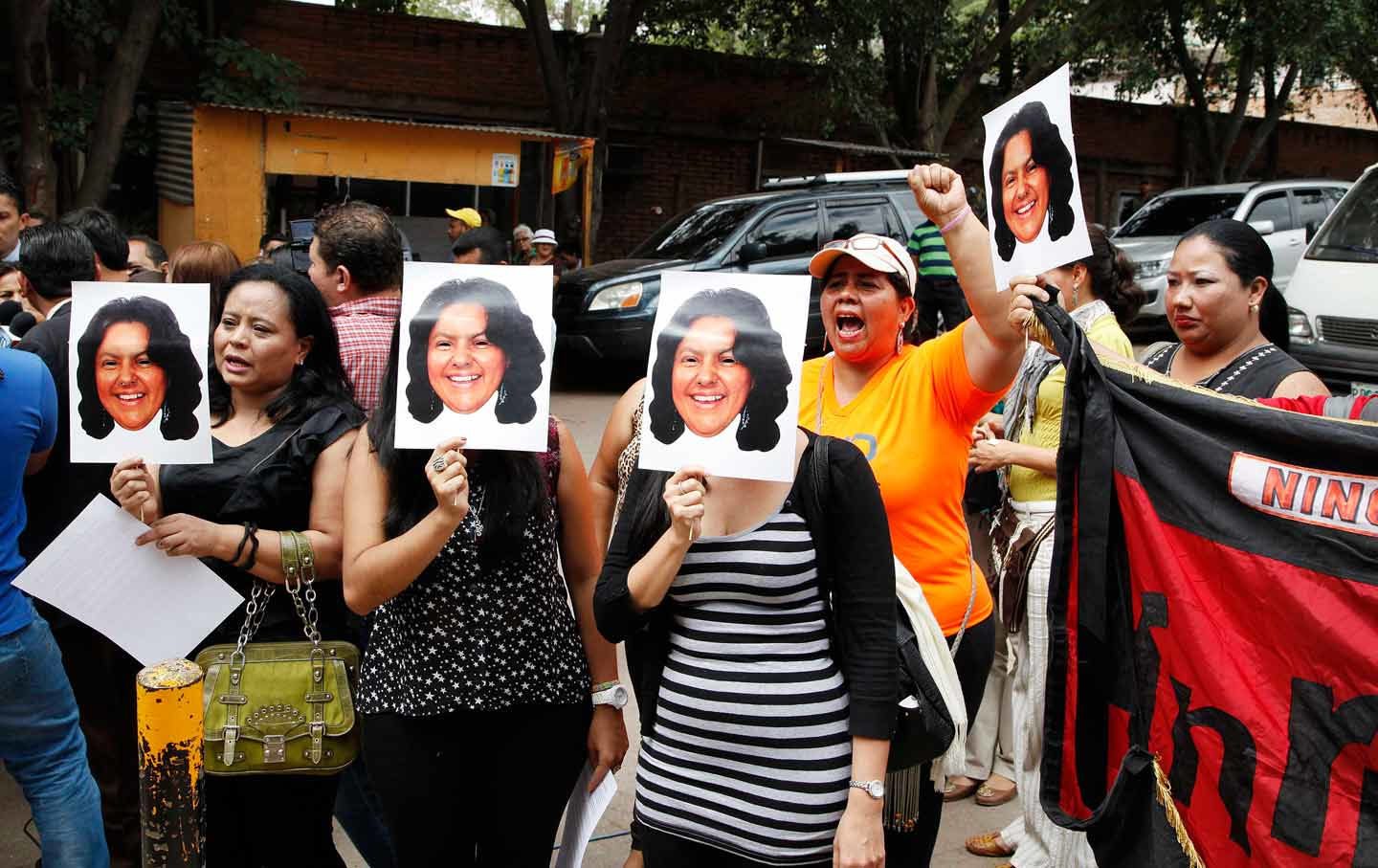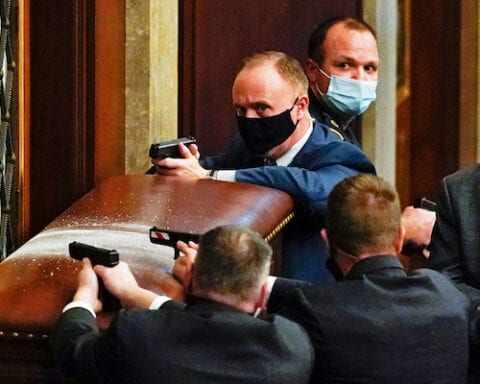On March 2nd of 2016, the internationally renowned human rights activist Berta Cáceres was murdered in her home in La Esperanza, Honduras. 6 shots were fired in her bedroom, killing Cáceres and leaving one witness to testify to the authorities. Given the nation’s long history of violent attacks against prominent protesters, Cáceres’ fate was woefully familiar to many protesting land rights in the region.
Ms. Cáceres, 44, had lead her indigenous Lenca community against a dam being built on their land for years via her prominent organization, the Civic Council of Popular and Indigenous Organizations of Honduras, known as Copinh. She won the Goldman Environmental Prize for her work defending her community.
On March 2nd, police in Honduras arrested the former CEO of Desarrollos Energéticos SA (DESA), the company building the dam, David Castillo Mejia. Castillo was captured at Honduras’ Ramón Villeda Morales International Airport, apparently trying to leave the country. Charged with being the “intellectual author” of the murder, after a 20 hour initial hearing, the high-ranking executive was sent to a detention center on Monday.
https://t.co/PPLnz0kpG3 https://t.co/K3EWLBrOg3
— COPINH (@COPINHHONDURAS) March 12, 2018
#JuzgadoPenal dicta Auto de Formal Procesamiento co Prisión Preventiva contra Roberto David Castillo acusado de Asesinato en perjuicio de Berta Cáceres. pic.twitter.com/RcKq60UK9A
— Poder Judicial HN (@PJdeHonduras) March 11, 2018
Eight other people, including DESA employees, hired assassins and members of the army were linked to her killing and have been arrested and tried. These include Sergio Ramón Rodríguez Orellana (DESA Manager), Douglas Geovanny Bustillo (ex-military), and Mariano Díaz Chávez (Major Army). Last year, a spokesman for the Attorney General’s office openly recognized that the men arrested were not the ones who planned the murder, nor the ones who gave the ultimate order to execute it.

A report released in early November from a team of international lawyers investigating the case (International Advisory Group of Experts, or GAIPE) indicated that the Honduran government has made only perfunctory efforts in the search for those responsible for Cáceres’ death. While Cáceres had received numerous death threats for years preceding her death, the state initially investigated members of Cáceres’ own organization and a past boyfriend for the murder. Cáceres family requested the legal team’s assistance last year due to their mistrust of the official investigation. The report suggests that there are multiple culpable high-ranking executives at DESA that the Honduran investigation has not charged.
MEMORIA Y LUCHA: hermosa noche recordando memoria de Berta Cáceres y luchas del pueblo hondureño. “No son los rebeldes los que crean los problemas del mundo, son los problemas del mundo los que crean a los rebeldes”.#BertaSeHizoMillones @COPINHHONDURAS https://t.co/11XZlT1Sjl
— Berta Caceres (@justiceforberta) March 8, 2018
The state investigation has even more access to evidence than the international team, but it has neglected to make further arrests. Critics of the Honduran administration say that this is due to the de facto impunity that protects families like the Atala Zablah, one of the most influential in Honduras, who injected millions of dollars into DESA and joined the DESA board. Business groups resist any action of the state investigation that looks into contracts between companies and these high-profile families.
Soon after the murder, the car of a judge overseeing the case was stolen – along with case files containing the identities of protected witnesses. This event was seen as a threat to anyone who might come forward with information about the crime in the future.
#BertaVive#BertaCáceres’ case is emblematic of the structural violence perpetrated by the Honduran state, and the United States’ role in #Honduras
To read the letter that @WitnessforPeace @SOAWatch sent to US Congress visit https://t.co/HW3eoUZiBv pic.twitter.com/YDgHf4v9bx— SOAWatch (@SOAWatch) March 3, 2018
The GAIPE lawyers gained access to 40,000 messages between the unnamed DESA executives and Sergio Rodríguez Orellana, the social and environment manager for DESA, and Douglas Geovanny Bustillo, a retired Honduran Army lieutenant who was DESA’s director of security until mid-2015. This access was achieved only after the state failed to present the texts to the family four times, and a judge ordered that the messages be shared.
In March of 2017, Georgia House Representative Henry C. Johnson introduced the Berta Cáceres Human Rights in Honduras Act (H.R. 1299) to Congress. 67 members of Congress have co-sponsored the bill, which would require the U.S. to suspend aid to Honduran security agencies and to refuse loans to Honduras.

Cáceres’ family members have spoken prolifically about how the state has failed them. Her mother, Austra, wrote that the Honduran government did not fulfill the responsibility it purposefully assumed to ensure Cáceres’ safety, and alleged that they contaminated the crime scene. Austra also accused the state of Honduras of criminalizing her daughter’s activism through a supposed institutionality, that had the result of working against Cáceres’ efforts to benefit underserved communities in the country.
The witness of the murder, Gustavo Castro, told Al Jazeera that the state investigation’s sketch artist attempted to tamper with the sketch they made. Cáceres’ daughter bemoaned that the DESA executives were so confident of impunity that they openly discussed the murder with each other on retrievable messaging apps. But now, Cáceres’ family has finally seen an iota of justice served in Castillo‘s arrest.
LIMA CHARLIE NEWS
Lima Charlie provides global news, insight & analysis by military veterans and service members Worldwide.
For up-to-date news, please follow us on twitter at @LimaCharlieNews
In case you missed it:

![Image Environmental activist assassination exposes corruption in Honduras [Lima Charlie News]](https://limacharlienews.com/wp-content/uploads/2018/03/Environmental-activist-assassination-exposes-corruption-in-Honduras-Berta-Caceres.png)


![Image U.S. immigration crisis could worsen if Nicaragua fails to hold it together [Lima Charlie News][Photo: Jorge Cabrera/Reuters]](https://limacharlienews.com/wp-content/uploads/2018/06/U.S.-immigration-crisis-could-worsen-if-Nicaragua-fails-to-hold-it-together-480x384.jpg)




![Image Memorial Day may soon be a remembrance of democracy and those who had the courage to defend it [Lima Charlie News]](https://limacharlienews.com/wp-content/uploads/2018/05/Memorial-Day-may-soon-be-a-remembrance-of-democracy-and-those-who-had-the-courage-to-defend-it-Lima-Charlie-News-480x384.png)
![The Mind of Bolton - AUMF and the New Iran War [Lima Charlie News]](https://limacharlienews.com/wp-content/uploads/2019/05/Inside-the-mind-of-Bolton-Lima-Charlie-News-main-01-480x384.png)
![Image U.S. immigration crisis could worsen if Nicaragua fails to hold it together [Lima Charlie News][Photo: Jorge Cabrera/Reuters]](https://limacharlienews.com/wp-content/uploads/2018/06/U.S.-immigration-crisis-could-worsen-if-Nicaragua-fails-to-hold-it-together-150x100.jpg)
